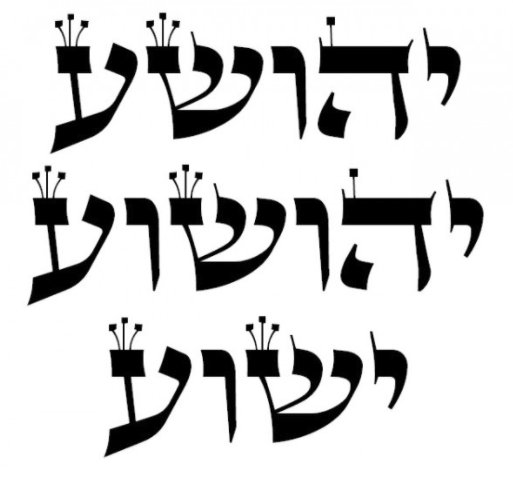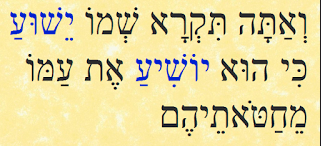The Hidden Name of Christ
“Nor is there salvation in any other, for there is no other name under heaven given among men by which we must be saved” (Acts 4:12).

The Hebrew alphabet does not include the letter “J”. In fact, the letter “J” was not invented until the 1500’s and it was used to replace soundings of “Y” and “I” and was created specifically to translate Jesus’s name. Here is what Dictionary.com says, “[Gian Trissino] was able to identify the Greek “Iesus” a translation of the Hebrew “Yeshua,” as the Modern English “Jesus.”
Interestingly, prior to the 1500’s the name of our Messiah was said without the sound of a “J”. And once more, how often do you, the reader, intertwine J’s, Y’s and I’s when pronouncing words? When looking at the Hebrew name for our Messiah, Yeshua, do you say the same word as Jesus?
This may seem arbitrary, but a quick look into the scriptures will show that the power of God is in the name of our Messiah. Have we been deceived by the liar and deceiver again?
If Adam and Eve, who were in the presence of God in the Garden of Eden, were able to be fooled by half-truths, it is entirely possible that the Church now, two millennia later, could be missing the most important detail to her faith, the name of our Messiah.
This article will cover:
- Scriptures on the power of our Messiah’s name (see now);
- The history of His name in Hebrew, Greek, and Aramaic, both in the Holy Bible and in ancient texts (see now);
- How a mistranslation of God the Father’s name has occurred before with the letter “J” (Jehovah) (see now);
- The correlation between the letter “Y” and the names of Father God, our Messiah, His holy people, and the city in which He dwells eternally (see now);
- Why it all matters (see now);
- And the Application of Truth and its Defense (see now)
Power in the Name of ….
Think about the identity of our Christ. He is called the Word of God (Rev 19:13, John 1:1). This Word was what was spoken from the initial creation, the Light which was spoken onto the depths of the darkness (Gen 1:1-4). Our Messiah is, without a doubt, the Beginning and The End (Rev 1:8-13; 22:3), the Faithful Witness of God (Rev 1:5).
As the Word of God, our Christ has influence over creation. In fact, without him nothing was made that has been made (John 1:3). Our Messiah knew the power of God.
The question becomes, if our Messiah taught His disciples this power, this ability to manifest His Spirit onto the lives of those hurting, onto the sick, onto darkness, then we too have a duty to seek these teachings as well, to manifest His Spirit in our lives.
Holy Bible – Scripture on His Name
Paul, seeing the Christ on the road to Damascus, was told by him that “I am ____” (Acts 9:5). What did the Word of God say His name was in that moment? Jesus or something else?
When Paul was requiring his sight to be restored, the Christ said to Ananias that Paul “is a chosen vessel of Mine to bear My name before the Gentiles (Acts 9:15)…I will show him how many things he must suffer for My name’s sake” (Acts 9:16).
Interestingly, it was the Christ’s name that Paul was persecuting people for calling upon (Acts 9:14, 21). It seems that both Paul and our Messiah knew the true name of our Christ was extremely powerful.
The Apostles’ Apologetics
Peter preached that “through His name, whoever believes in Him will receive remission of sins” (Acts 10:43).
Higher Than Any Other Name
“Whatever you ask in my name, this I will do, that the Father may be glorified in the Son. If you ask me anything in my name, I will do it” (John 14:13-14).
“Truly, truly, I say to you, whatever you ask of the Father in my name, he will give it to you. Until now you have asked nothing in my name. Ask, and you will receive, that your joy may be full” (John 16:23-24).
Prophecy
Remember the story of Christ’s birth? An angel came to Joseph and told him something. What did the angel say?
I wonder if the angel said Jesus or another name? Does it matter to you that God sent an angel to relay a specific message, an eternal name, and commanded the Christ’s parents to use such name at His birth?
If Father God cared so much about the name being right, shouldn’t we?
The Name Above All Names – Yehoshua/Yeshua/Yesu

It is clear, the name of Christ is essential to the power attached to it. So, what is Christ’s real name?
The Kione Greek word written for Christ’s name in the New Testament of the Holy Bible is Iēsous (ē-ā-sü’s) and the etymology of this word is Yehoshua (yeh·hō·shü’·ah) and is referred to in Hebrew as yod-hey-waw-shin-ayin. The root of Yehoshua is Father God’s name, YHWH (yod-hey-vav-hey). More on God the Father’s name will be described later on.
The name Iēsous is also used in the New Testament when talking about Joshua from the Old Testament, the leader of Israel into the promise land (cf. Acts 7:45, Heb 4:8). Joshua’s name is also written as Iēsous in the Septuagint, the Greek version of the Old and New Testaments in the Holy Bible.
It is clear by both of these examples that the Christ’s name is written the same in Greek as Joshua’s name and Joshua’s name in Hebrew is Yehoshua.
What does Yehoshua mean?
Yeho, another form of Yahu, is a theophoric element of God’s name in YHWH, so it is literally part of Father God’s name. Shua means “a cry for help” or “a saving cry,” and literally translates as “a shout given when in need of rescue.”
Christ’s name means God is there when we shout for Him to rescue us! No wonder the power is in His name!
Importance of Joshua
What is Joshua’s name in Hebrew? Hoshea at first and then Yehoshua (or Y’hoshua). Joshua’s original name was Hoshea, meaning salvation (Num 13:8; Deut 32:44). Moses then gave him the name Joshua (Yehoshua) when he was sent to explore the promised land as a spy (Num 13:16).
Prior to this name change, the Septuagint even uses the Greek Iēsous to delineate Joshua’s original name Hosea, as seen in the photo in (Deut 32:44).

Both Yehoshua and Yeshua can be seen as being interchangeable, although Yehoshua is a stronger form of the name, as longer names have explicit value. Hebrews believe God can approve or disapprove people and thus elongate or shorten their names.
Take Abraham for example. His name was originally Abram but then God changed it to Abraham. Much like this, Yehoshua to Yeshua would be seen as a disapproval by God in similar circumstances.
The Talmud, in Arachim 32b, states that “Joshua’s failure to implore the Lord to remove the passion for idolatry was his assumption that he possessed the land in its pristine holiness, so that it would in itself help Israel to overcome its idolatrous tendencies” and that this lack in imploring the Lord generated a disapproved form of the name.
No matter whether Yeshua or Yehoshua, the name of Joshua is not Jesus and the name of Jesus, well, is not Jesus, it’s Joshua.
Think about it in the narrative of the Holy Bible. Joshua was the one who led God’s people into His holy and promised land. The Christ is the door leading people to God’s eternal holy land. Joshua was the only other person to go on to Mt. Sinai with Moses, as his helper. Jesus is our helper in our ascent to the Kingdom of Heaven.
Additional Texts on Yeshua
Looking into Tal Ilan’s lexicon of the Second Temple, we find that there are 85 examples of Joshua’s name as Yeshua, 15 examples of his name being Yehoshua, and 48 examples of his name being Iēsous!1
In the Hebrew bible, Joshua’s name is Y’hoshua, while in the same bible, Jesus’s name is Yeshua, such as in the Hebrew bible’s account of Matthew 1:21, “And she shall bear BEN (Son) and you will call SHMO (his name, Zech 6:12) YEHOSHUA/YESHUA (Zech 6:11-12) because he will bring his people yeshuah (rescue, salvation, deliverance) from their peyshaim (rebellions)”.
In the Talmud, the Messiah is referenced as Yeshua ha-Notzri and Yesu ha-Notzri. Yeshu is seen in this light as a derogatory name “may his name and memory be blotted out” , which would align with the rabbinic culture seeing the Christian Christ as rebellious.
World-renown New Testament scholar, David Flusser, writes in his book Jewish Sources in Early Christianity that,
Looking at how our Messiah took on the scorn and shame, becoming obedient to death, and becoming lesser, a servant to all, it would not be out of His character to take the weakest form of Joshua’s name, Yeshu, instead of the stronger forms of Yeshua or Yehoshua.
When looking at the Greek Iēsous in Strong’s Concordance, it is interesting to see that this word was written in the New Testament 338x as Iēsou (Ἰησοῦ), 503x as Iēsous (Ἰησοῦς), and 134x as Iēsouv (Ἰησοῦν). Iēsou would seem phonetically to be read as Yeshu.

The “s” added to Yeshua or Yeshu is not to indicate the “s” sound but indicating it is a nominative cased ending. The “s” therefore is not part of the way we say His name. As well, the “sh” part of the “sh” in Yehoshua (yeh·hō·shü’·ah) and is referred to in Hebrew as yod-hey-waw-shin-ayin (as mentioned earlier), is required in the name but was removed due to a lacking in Greek translation.
As well, the “ayin” making the Hebrew “a” sound is also missing from the name (yod-hey-waw-shin-ayin).
For some reason, this seems to be missing from our everyday knowledge.
YHWH Not Jehovah – This Has Happened Before

This tradition is part of the culture of God, including the earliest manuscripts found in the Dead Sea Scrolls where God’s name is referenced as set apart and different than the surrounding text. The Septuagint replaces God’s name for a different word, like many other manuscripts, as this is a sign of reverence and respect for His name.
The problem occurred in the translation of God’s name YHWH, into Jehovah. How did this happen? It was due to the addition of words on top of the Lord’s name.
Manuscript writers would replace YHWH with the word Adonai and write it above His name in text. YHWH has no vowels in the name, and so, in efforts to pronounce this word, vowels were added to make it Yahweh. When it comes to Jehovah, we see a combination between linguistic interpretation and mistranslation.


In cultures that had no “Y” or “W” in their alphabet, these consonants were replaced with the “J” and “V” sounds. In requiring vowels to literate God’s name, the word Adonai was combined with JHVH to make Jehovah, using the vowels from Adonai and the consonants from JHVH.
This is how God’s name was misinterpreted, made up, and made unnatural to the original Biblical, Hebrew name He has given us.
*View this video to learn more on saying His name!
Holiness Begins With a “Y”
Is it a coincidence the name of Father God starts with a Y (YHWH), that the Son of God’s name starts with a Y (Yeshu/ Yeshua/ Yehoshua), that the people of God starts with a Y (Israel = Yisrael), and that the city where Father God, His Son, and His holy people dwell in the new creation (Rev 21:2) starts with a Y (Jerusalem = Yerushalayim)?
What about knowledge, to know something in Hebrew is yodea, yada’, and yeda. The word knowledge, da’at is derived from yada’.
What’s so special about yada’, well it is how we know God. “But since then there has not arisen in Israel a prophet like Moses, whom the Lord knew face to face” (Deut 34:10). This knowing is exactly what we should strive for as followers of Christ, to know God as Moses, to see Him face to face.
As well, yada can be used in a sexual sense, as when Adam knew Eve and she bore Cain (Gen 4:1). Knowing God, His Son, His Holy City, and His people, all begin with the sound/letter “Y”!
What about the linage of God’s royal people?
Jacob is “Yaakov or Ya’akov”
James (the brother of Christ) is also “Yaakov or Ya’akov”
Judah is “Yehuda”
Joseph is “Yosef”
John is “Yohanan, Yehohanan, or Yochanan”
Joshua is “Yeshua or Yehoshua”
Is a theme occurring in the text!? Does Holiness begin with a “Y”!?
Does This Really Matter?
God uses naming, and renaming, to alter history, to shape creation as we know it. From the beginning of the Bible, we have not just any god being revealed to us in the narrative, we have a god with a name, YHWH God (Gen 1:1) –the term LORD replaces His name in most bibles.
From the beginning of scripture, we have a God who is named! As well, the first science performed by mankind was the naming animals. In fact, this is the first act recorded to be done by mankind in the Holy Bible.
Father God gave Adam the authority to name animals, a blessing above any host of the heavens. This process of naming was how Adam got to know the animals, read how the scripture explains this,
It was the processes of naming the animals that brought about the knowing of these beasts in an intimate and personal way to Adam. How else would a comparable strength for Adam not be found unless this was to be true!?
Isn’t the entire point of following Christ to know Him, to know Him like He knew Father God, so that we could know Father God the same way Christ did? If the naming process gave Adam a close relationship with the animals, then God’s naming process in revealing Christ’s name to His people is just as important in our relationship development with our Messiah!
A Proof in the Changing of Names
Ever notice that God specifically changes the names of people in the bible? Christ changed Peter’s name from Simon to Petros (Mt 16:18). Father God specifically changed the name of Abram to Abraham and Sarai to Sarah (Gen 17:5,15).
God specifically asked Jacob, face to face, what his name was and then changed his name to Yisrael. When Yisrael asked God His name, God blessed him.
Did you know that God even says in scripture that He will change the names of all who enter into His kingdom?
Application – Seeing the Truth
The rest of the article is separated by scriptures that shows that by the name of our Christ, His eternal power is revealed. Take to these passages with an open heart and see where the Spirit leads you.
Adoption by His Name
Healings, Signs, & Wonders Done in His Name
Salvation by His Name
Hope in His Name
Baptism in His Name
Application – Defense Through Truth
Do you believe you have an enemy?
Do you believe knowing Jesus is the answer to battling that enemy?
Are You in a War?
Christians know that deception will infiltrate the church (1 Tim 4:1), by liars (1 Tim 4:2) by the liar and deceiver, the one who has lied from the beginning, the father of lies? (John 8:44). Did you know sound doctrine will not be endured by many and that rebuking, exhorting, and longsuffering in teaching will be required (2 Tim 4:2-3)?
Could it be that there has been an attack on the name of our Messiah?
Amazing Narrative of Mankind’s Purposed Naming by God
Reference
1Quarles, C. (2008). Buried Hope or Risen Savior/ The Search for the Jesus Tomb. B&H Academic. p. 81. B01FGL3J0U



